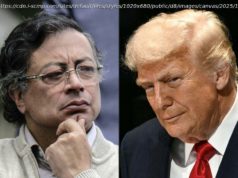United States President Donald Trump’s administration to enter into framework agreement and execution in near future, China to buy more American goods. When President…
United States President Donald Trump’s administration to enter into framework agreement and execution in near future, China to buy more American goods.
When President Donald Trump stood at the podium during his campaign in 2016, coverage from CNN recalls that he frequently referred to China as a currency manipulator and had stated that a combination of Chinese policy and American incompetence at the negotiating table had led to China “raping” the American manufacturing sector, and by extension, the American economy.
“We can’t continue to allow China to rape our country, and that’s what they’re doing… We’re going to turn it around. And we have the cards, don’t forget it. We’re like the piggy bank that’s being robbed. We have the cards. We have a lot of power with China…”
CNN’s Jeremy Diamond concludes this segment with further explanation of President Trump’s position at the time.
“Trump added that he is not ‘angry at China,’ but with U. S. leaders whom he accused of being ‘grossly incompetent.’”
Today, there are indications that, through ongoing negotiations between the two nations, the balance sheet between them may begin to live up to its name. The BBC reports that United States Treasury Secretary Steven Mnuchin spoke of a tentative framework to be hammered out between the United States and China this morning on Fox News Channel. Through negotiations with Chinese representatives over the past week or so, the anticipated trade war has been put on hiatus and both nations appear ready to correct the imbalance through more diplomatic and mutually beneficial means.
Perhaps most notably, Mnuchin spoke of a potential remediation of the massive trade deficit for the United States with regards to its bilateral dealings with China. Though the Treasury Secretary refused to disclose hard targets for the reduction of the trade deficit – wisely avoiding tipping his hand during high-stakes negotiation — he did mention a specific avenue for energy purchases that would be worth approximately $50 to $65 million per year.
Currently, the United States holds a $462 billion trade deficit with China, meaning that China exports far more products to American shores than the reverse. This creates a consumer culture, a burgeoning service industry, yet a sickly manufacturing sector. Given that manufacturing jobs, particularly in cottage industries, produce more value and higher incomes for workers than service industry positions, the American economy benefits from a more balanced trade situation. China has signaled that they are ready to do more buying from United States businesses, and Mnuchin reiterates as much with his recap with Chris Wallace of FNC.
“I don’t think we are going easy on the trade talks at all. I think for the first time, OK, many presidents haven’t dealt with this issue. President Trump has dealt with this issue. He threatened to put on $150 billion tariffs. We have a really good framework agreement that’s not just about buying goods. It’s about structural changes. It’s about lowering tariffs. China has committed to lower tariffs on many things and made structural changes and protect our technology. So, these are very important issues for the U. S. economy, and now, we are going to make sure that this gets implemented.”
With the peripheral deal with ZTE looking set to go through, there can be little doubt that negotiations are ongoing and seem to be proceeding well. It is appearing to be increasingly likely that a trade war may not, in fact, develop, being routed before it began by deal-making made between Trump and Xi’s political proxies. A rising China with a thirst for American goods and entertainment may signal a more mutually optimistic future for both economies if a deal is struck.






